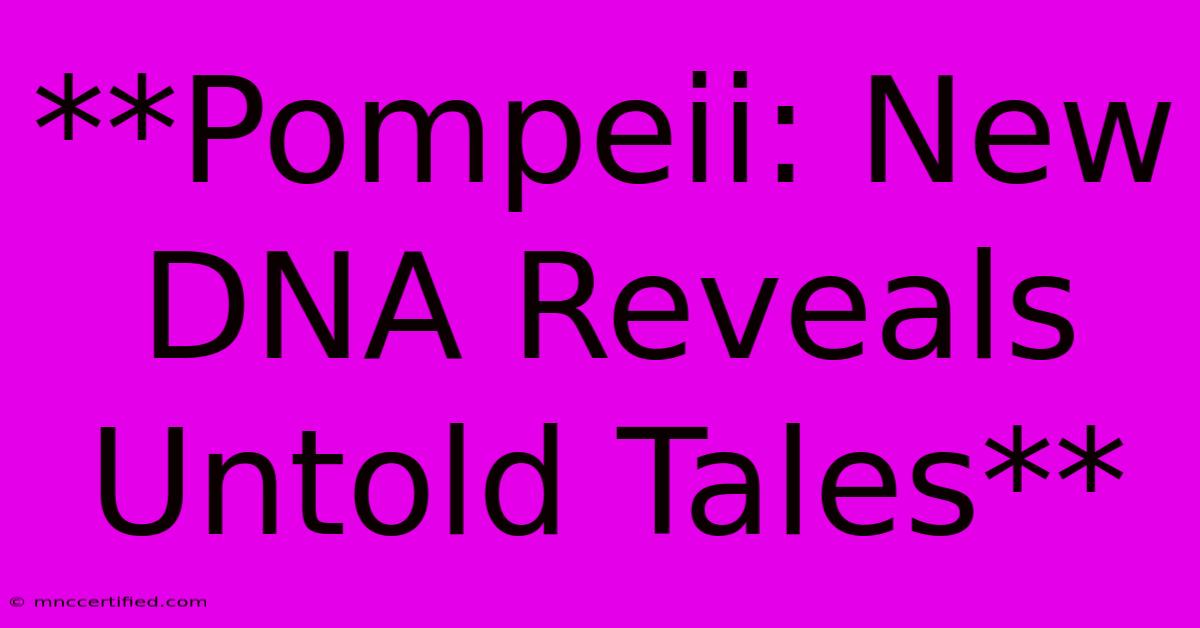**Pompeii: New DNA Reveals Untold Tales**

Table of Contents
Pompeii: New DNA Reveals Untold Tales
The ancient Roman city of Pompeii, frozen in time by the catastrophic eruption of Mount Vesuvius in 79 AD, continues to reveal its secrets. And now, thanks to groundbreaking advancements in DNA analysis, we are getting a glimpse into the lives of its inhabitants like never before.
Unveiling the Past Through Genetic Clues
For decades, archaeologists have meticulously unearthed the remains of Pompeii, uncovering its intricate streets, vibrant frescoes, and the poignant stories frozen in ash. But until recently, understanding the individuals who once lived and breathed within its walls was limited to skeletal remains and artifacts. Now, a team of researchers from the University of Naples Federico II has unlocked a new chapter in Pompeii's history - its genetic code.
Using cutting-edge techniques, they have successfully extracted and analyzed ancient DNA from the skeletal remains of Pompeii's victims. This groundbreaking research has yielded astonishing results, shedding light on the individuals' origins, health, and even their daily lives.
Unraveling Ancestry and Origins
The DNA analysis has revealed surprising insights into the genetic makeup of Pompeii's population. The research confirmed the diverse origins of the city's inhabitants, with individuals displaying ancestry linked to regions across the Mediterranean, including Greece, the Middle East, and North Africa. This discovery challenges previous assumptions about the city's inhabitants and highlights its cosmopolitan nature.
A Window into Health and Diet
Beyond ancestry, the genetic data provides valuable information about the health of Pompeii's residents. Researchers have identified genetic markers associated with various health conditions, such as malaria and tuberculosis. This data, combined with archaeological evidence, helps paint a more comprehensive picture of the health challenges faced by the ancient Pompeiians.
Moreover, analysis of their diet is possible through the examination of stable isotopes in their bones. This offers clues about their food sources and the impact of their environment on their nutrition.
Personalizing the Story
The real power of this DNA research lies in its ability to personalize the stories of Pompeii's individuals. Researchers can now link skeletal remains to specific individuals, adding a human touch to the archaeological findings. For example, DNA analysis has revealed familial relationships between victims found in different parts of the city, revealing the devastating impact of the eruption on entire families.
Ethical Considerations and Future Research
The ethical implications of studying ancient DNA are not to be overlooked. Researchers must carefully consider the privacy and respect of the deceased individuals and engage in ethical practices to ensure the responsible use of this sensitive data.
The future of DNA research in Pompeii is promising. As technology advances, scientists will be able to unlock even more information about the city's inhabitants. This includes:
- Tracing migration patterns: DNA can be used to map the movements of people across the Roman Empire, highlighting the complex social and cultural dynamics of the time.
- Uncovering disease outbreaks: DNA analysis can help identify pathogens that caused disease outbreaks in the past, providing valuable insights into the history of medicine and public health.
- Investigating environmental factors: DNA can be used to study the environmental conditions of Pompeii, such as climate change and volcanic activity.
Redefining the Past, Present, and Future
The use of DNA analysis in Pompeii is not just a scientific breakthrough but also a profound historical event. By studying the genetic code of its inhabitants, we gain a deeper understanding of their lives, their struggles, and their resilience. This knowledge helps us to appreciate the complexity of ancient cultures and the interconnectedness of humanity across time.
As we continue to unravel the secrets of Pompeii, one thing is clear - the past holds valuable lessons for the present and future. By understanding the past, we can better navigate the challenges of the present and build a more informed and empathetic future.

Thank you for visiting our website wich cover about **Pompeii: New DNA Reveals Untold Tales**. We hope the information provided has been useful to you. Feel free to contact us if you have any questions or need further assistance. See you next time and dont miss to bookmark.
Featured Posts
-
Annie Metzler Insurance Quarryville Pa
Nov 09, 2024
-
Watch City Vs Rovers On Cardiff City Tv
Nov 09, 2024
-
Taylor Morrison Insurance Services Inc
Nov 09, 2024
-
Buy Crypto With Vanilla Visa Gift Card
Nov 09, 2024
-
Box Office Paddington In Peru Leads Uk Ireland
Nov 09, 2024